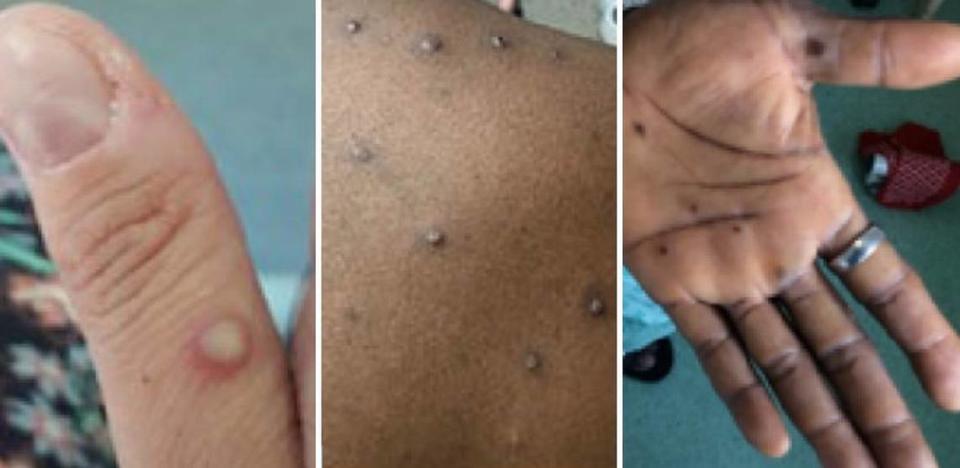Monkeypox cases rise in Fresno, raising concerns over wider spread. Who’s most at risk?
Seven total cases of monkeypox have been confirmed in Fresno County, local health officials said Friday afternoon, and they expressed concern that the virus and its highly contagious rash could spread to more people.
That’s an increase from three cases reported July 28.
Across California and nationwide, the vast majority of monkeypox cases are occurring among men who have sex with other men, but cases are popping up among people outside of that demographic as well, said Dr. Rais Vohra, interim health officer with the Fresno County Department of Public Health.
“There is a lot of misinformation. You may have heard that it’s an STD” (sexually transmitted disease), Vohra said Friday in a video briefing with reporters.
“It’s really a disease that spreads through close contact, whether that’s sexual or not. So it can actually be spread whenever a person comes in contact with the lesions of the rash caused by monkeypox.”
“It’s not necessarily related to sexual activity,” he added. “Body fluids, sores on an infected person’s skin, even materials that an infected person has touched such as clothing or linens or plates, utensils or cups – all of those are thought to be vectors of transmission.
The county health department has a web page devoted to monkeypox, including frequently asked questions, that is available to the public at co.fresno.ca.us/departments/monkeypox.
So far in Fresno County, Vohra said all seven patients are men between the ages of 20 and 50. All are recovering at home.
Vohra and Joe Prado, assistant director of the Fresno County Department of Public Health, both warned that while monkeypox is not a sexually transmitted disease, the rash and lesions are similar enough to some true STDs that are circulating in the region.

As a result, they urge anyone with a rash to get tested not only for monkeypox, but for syphilis, gonorrhea and others to rule them out for diagnosis or rule them in for treatment.
“It’s really important to look at those other diseases,” said Mary Morrisson, a public health nurse for Fresno County. “We’ve heard stories of people thinking they had monkeypox but it was actually syphilis. We’re grateful they got tested, and now we know and they can get treated.”
Vohra said history has shown that some diseases started in a small population segment, “for example, in the gay population, but then jump over and becomes something that affects almost all demographics.” He added that is “a tacit concern (for monkeypox) that is perhaps driving some of the emergency declarations” by California state leaders and the federal government.
“We saw this in syphilis in 2014 and 2015,” when it was predominantly among men who have sex with other men, Morrisson said, with very few cases in other population segments of Fresno County. But by the middle of 2016, “we were in the middle of an outbreak, and that outbreak is now our new norm, unfortunately.”
“So yes, we saw this with syphilis, and I think it’s an easy leap to think that might happen with monkeypox as well,” Morrisson added.
For all the attention being shone on monkeypox, Prado said that Fresno County and throughout the Central Valley, “we have high incident rates of sexually transmitted diseases, whether it’s gonorrhea, chlamydia, syphilis and congenital syphilis as well.”
“We have higher rates of syphilis, higher rates of gonorrhea and chlamydia in this community than we do of monkeypox, no matter how you look at the numbers,” he added.
Investigation teams for the county are reaching out to known close contacts of the current monkeypox patients to urge them to isolate and get vaccinated with monkeypox vaccine to limit the potential spread of the virus, which is related to smallpox but much more mild.
In recent weeks, available vaccine doses allocated to Fresno County by the California Department of Public Health have been extremely limited, but more vaccine is being made available.
Prado said vaccine eligibility remains confined to known close contacts of confirmed patients; people who already have been diagnosed with a sexually-transmitted disease and may be more at risk of contracting monkey; and anyone who has attended a venue at which a known monkeypox exposure occurred within the past two weeks.
Vohra said it is best for a person to receive their first shot of vaccine – part of a two-dose regimen with shots four weeks apart – within four days of their initial exposure if possible. “That’s why we’re working as fast as we can with the seven cases that have been identified.”
“We know that number will rise,” he added. “It might even mushroom; knock on wood it won’t, but we have to anticipate that contingency.”
Vohra said that in addition to the rash that characterizes the monkeypox virus, other symptoms resemble “a flu-like illness.”
“Some people describe chills, fatigue, body aches all over their body, low energy,” he said. “Sometimes they have headaches, backaches, and sometimes they have swollen lymph nodes. But it’s really that rash that’s going to drive people to go seek care.”
Vohra said the lesions may last for two to three weeks before drying up, scabbing over and falling off, at which point a person is no longer contagious.
“The vast majority of people are going to heal up on their own,” Vohra said. “Most people may have a fair amount of pain (from the rash), but it’s something that can be managed at home. … A very small number, probably less than 10%, may have severe symptoms.”

